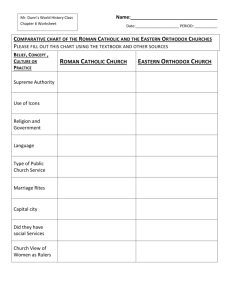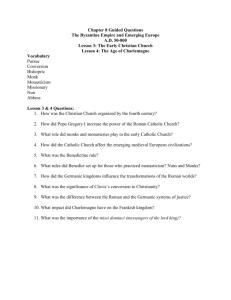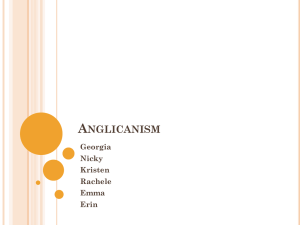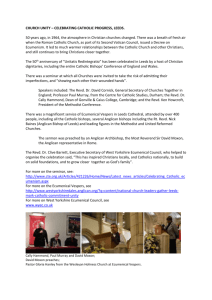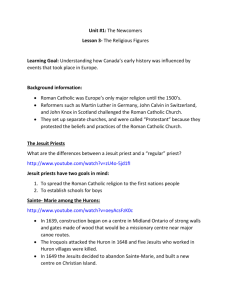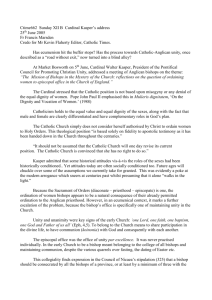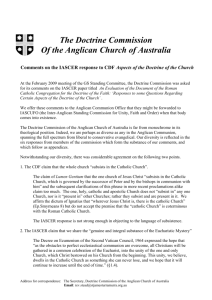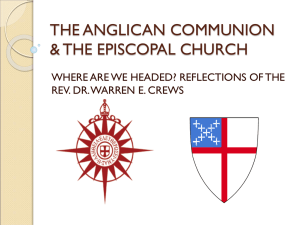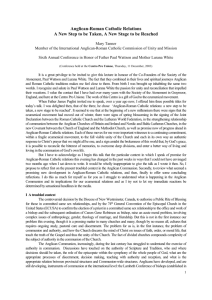Church Times article on the Apostolic Constitution
advertisement
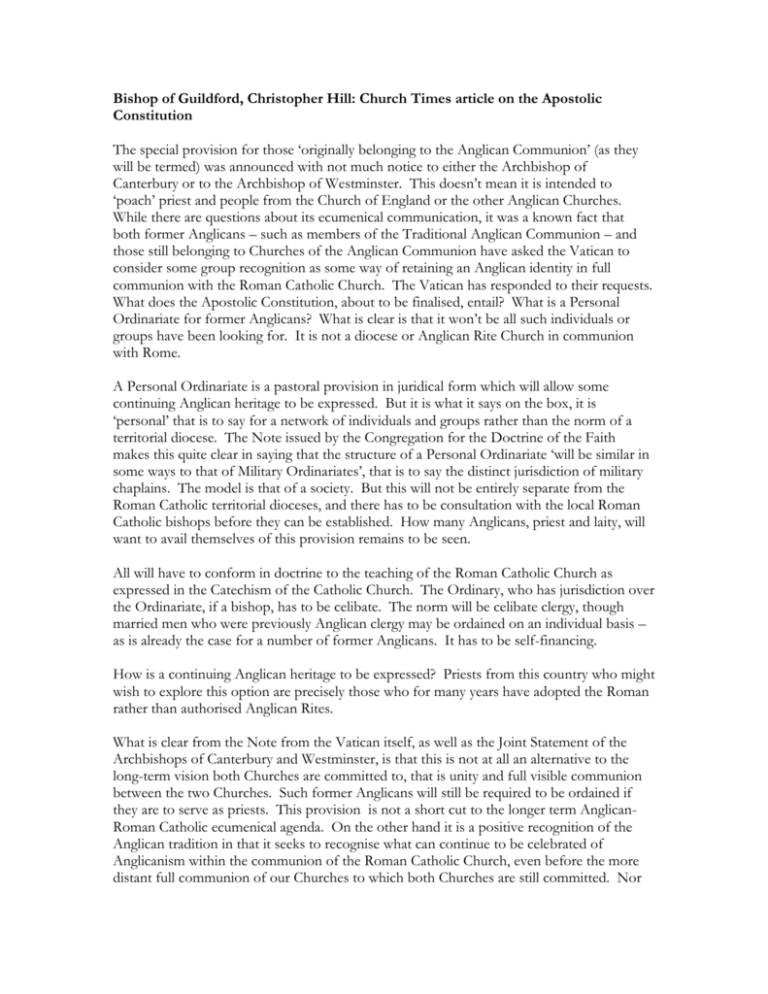
Bishop of Guildford, Christopher Hill: Church Times article on the Apostolic Constitution The special provision for those ‘originally belonging to the Anglican Communion’ (as they will be termed) was announced with not much notice to either the Archbishop of Canterbury or to the Archbishop of Westminster. This doesn’t mean it is intended to ‘poach’ priest and people from the Church of England or the other Anglican Churches. While there are questions about its ecumenical communication, it was a known fact that both former Anglicans – such as members of the Traditional Anglican Communion – and those still belonging to Churches of the Anglican Communion have asked the Vatican to consider some group recognition as some way of retaining an Anglican identity in full communion with the Roman Catholic Church. The Vatican has responded to their requests. What does the Apostolic Constitution, about to be finalised, entail? What is a Personal Ordinariate for former Anglicans? What is clear is that it won’t be all such individuals or groups have been looking for. It is not a diocese or Anglican Rite Church in communion with Rome. A Personal Ordinariate is a pastoral provision in juridical form which will allow some continuing Anglican heritage to be expressed. But it is what it says on the box, it is ‘personal’ that is to say for a network of individuals and groups rather than the norm of a territorial diocese. The Note issued by the Congregation for the Doctrine of the Faith makes this quite clear in saying that the structure of a Personal Ordinariate ‘will be similar in some ways to that of Military Ordinariates’, that is to say the distinct jurisdiction of military chaplains. The model is that of a society. But this will not be entirely separate from the Roman Catholic territorial dioceses, and there has to be consultation with the local Roman Catholic bishops before they can be established. How many Anglicans, priest and laity, will want to avail themselves of this provision remains to be seen. All will have to conform in doctrine to the teaching of the Roman Catholic Church as expressed in the Catechism of the Catholic Church. The Ordinary, who has jurisdiction over the Ordinariate, if a bishop, has to be celibate. The norm will be celibate clergy, though married men who were previously Anglican clergy may be ordained on an individual basis – as is already the case for a number of former Anglicans. It has to be self-financing. How is a continuing Anglican heritage to be expressed? Priests from this country who might wish to explore this option are precisely those who for many years have adopted the Roman rather than authorised Anglican Rites. What is clear from the Note from the Vatican itself, as well as the Joint Statement of the Archbishops of Canterbury and Westminster, is that this is not at all an alternative to the long-term vision both Churches are committed to, that is unity and full visible communion between the two Churches. Such former Anglicans will still be required to be ordained if they are to serve as priests. This provision is not a short cut to the longer term AnglicanRoman Catholic ecumenical agenda. On the other hand it is a positive recognition of the Anglican tradition in that it seeks to recognise what can continue to be celebrated of Anglicanism within the communion of the Roman Catholic Church, even before the more distant full communion of our Churches to which both Churches are still committed. Nor would this recognition have been possible without the achievements of the AnglicanRoman Catholic International Commission over many years. One very significant factor in the announcement here was that it was made by the Archbishops of Canterbury and Westminster together. The implementation – should it be requested of Rome by individuals and groups – will not by-pass the Roman Catholic Bishops. Nor will such implementation be without continuing consultation with the Church of England through the Archbishop of Canterbury. This was also affirmed in the Joint Statement by the two Archbishops. This unity was apparent at the Press Conference – supported by two former Co-Secretaries of ARCIC, Archbishop McDonald of Southwark and myself. The timing of this announcement – in terms of our debates on the ordination of women to the episcopate – may be unfortunate but it was not deliberate. Requests have been made to the Vatican by individuals and groups wishing to find their future within the Roman Catholic Church. The Vatican has now responded pastorally to these requests. The Archbishop of Canterbury, personally assured by a visit by Cardinal Levada of the Doctrine of the Faith, has said ‘this new possibility is in no sense at all intended to undermine the existing relations between our two communions or to be an act of proselytism or aggression’. The provision may help some. It is also a recognition of the partial but painful communion Anglicans and Roman Catholics already share. +Christopher Hill Bishop of Guildford 21 October 2009

